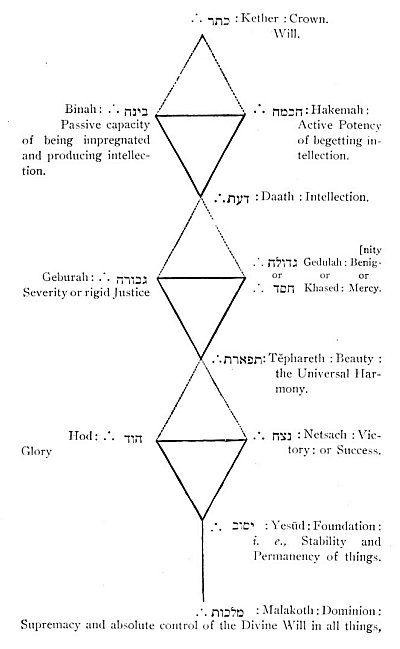This was the profound truth hidden in the ancient allegory and covered from the general view with a double veil. This was the esoteric meaning of the generation and production of the Indian, Chaldæan, and Phœnician cosmogonies; and the Active and Passive Powers, of the Male and Female Principles; of Heaven and its Luminaries generating, and the Earth producing; all hiding from vulgar view, as above its comprehension, the doctrine that matter is not eternal, but that God was the only original Existence, the ABSOLUTE, from Whom everything has proceeded, and to Whom all returns: and that all moral law springs not from the relation of things, but from His Wisdom and Essential Justice, as the Omnipotent Legislator. And this Taut WORD is with entire accuracy said to have been lost; because its meaning was lost, even among the Hebrews, although we still find the name (its real
p. 702
meaning unsuspected), in the Hu of the Druids and the FO-Hi of the Chinese.
When we conceive of the Absolute Truth, Beauty, or Good, we cannot stop short at the abstraction of either. We are forced to refer each to some living and substantial Being, in which they have their foundations, some being that is the first and last principle of each.
Moral Truth, like every other universal and necessary truth, cannot remain a mere abstraction. Abstractions are unrealities. In ourselves, moral truth is merely conceived of. There must be somewhere a Being that not only conceives of, but constitutes it. It has this characteristic; that it is not only, to the eyes of our intelligence, an universal and necessary truth, but one obligatory on our will. It is A LAW. We do not establish that law ourselves. It is imposed on us despite ourselves: its principle must be without us. It supposes a legislator. He cannot be the being to whom the law applies; but must be one that possesses in the highest degree all the characteristics of moral truth. The moral law, universal and necessary, necessarily has as its author a necessary being;–composed of justice and charity, its author most be a being possessing the plenitude of both.
As all beautiful and all true things refer themselves, these to a Unity which is absolute TRUTH, and those to a Unity which is absolute BEAUTY, so all the moral principles centre in a single principle, which is THE GOOD. Thus we arrive at the conception of GOOD in itself, the ABSOLUTE Good, superior to all particular duties, and determinate in those duties. This Absolute Good must necessarily be an attribute of the Absolute BEING. There cannot be several Absolute Beings; the one in whom are realized Absolute Truth and Absolute Beauty being different from the one in whom is realized Absolute Good. The Absolute necessarily implies absolute Unity. The True, the Beautiful, and the Good are not three distinct essences: but they are one and the same essence, considered in its fundamental attributes: the different phases which, in our eyes, the Absolute and Infinite Perfection assumes. Manifested in the World of the Finite and Relative, these three attributes separate from each other, and are distinguished by our minds, which can comprehend nothing except by division. But in the Being from Whom they emanate, they are indivisibly united; and this Being, at once triple and one, Who
p. 703
sums up in Himself perfect Beauty, perfect Truth, and the perfect Good, is GOD.
God is necessarily the principle of Moral Truth, and of personal morality. Man is a moral person, that is to say, one endowed with reason and liberty. He is capable of Virtue: and Virtue has with him two principal forms, respect for others and love of others, justice and charity.
The creature can possess no real and essential attribute which the Creator does not possess. The effect can draw its reality and existence only from its cause. The cause contains in itself, at least, what is essential in the effect. The characteristic of the effect is inferiority, short-coming, imperfection. Dependent and derivate, it bears in itself the marks and conditions of dependence; and its imperfection proves the perfection of the cause; or else there would be in the effect something immanent, without a cause.

Moe is the founder of GnosticWarrior.com. He is a father, husband, author, martial arts black belt, and an expert in Gnosticism, the occult, and esotericism.





